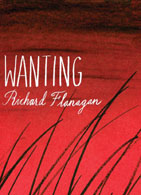 | Reviews of Wanting Richard Flanagan Random House 2008 |
[This novel has been longlisted for the 2009 Miles Franklin Award.]
From the publisher's page:
It is 1839. A young Aboriginal girl, Mathinna, is running through the long wet grass of an island at the end of the world to get help for her dying father, an Aboriginal chieftain. Twenty years later, on an island at the centre of the world, the most famous novelist of the day, Charles Dickens, realises he is about to abandon his wife, risk his name and forever after be altered because of his inability any longer to control his intense passion.ReviewsConnecting the two events are the most celebrated explorer of the age, Sir John Franklin - then governor of Van Diemen's Land - and his wife, Lady Jane, who adopt Mathinna, seen as one of the last of a dying race, as an experiment. Lady Jane believes the distance between savagery and civilisation is the learned capacity to control wanting. The experiment fails, Sir John disappears into the blue ice of the Arctic seeking the Northwest Passage, and a decade later Lady Jane enlists Dickens' aid to put an end to the scandalous suggestions that Sir John's expedition ended in cannibalism.
Dickens becomes ever more entranced in the story of men entombed in ice, recognising in its terrible image his own frozen inner life. He produces and stars in a play inspired by Franklin's fate to give story to his central belief that discipline and will can conquer desire. And yet the play will bring him to the point where he is no longer able to control his own passion and the consequences it brings.
Inspired by historical events, WANTING is a novel about art, love, and the way in which life is finally determined never by reason, but only ever by wanting.
Don Anderson in "The Australian".
Without doubt a main subject of Wanting is what its author calls the "catastrophe of colonialism". Notions of the "savage", the "other", warp all sorts of notions and arguments. Thus, one-third into the novel, a propos allegations of Franklin's crew's cannibalism, Dickens asserts: "We all have appetites and desires. But only the savage agrees to sate them with all the attendant horrors that ensue." Almost at the novel's end, however, Dickens, his cheek pressed on stage against Ellen's "uncorsetted belly", notes that "he, a man who had spent a life believing that giving in to desire was the mark of a savage, realised that he could no longer deny wanting"."Publisher's Weekly": "The interlaced stories focus on conquering the yearning that exists both in the Aboriginals and the noble English gentlemen, and though Flanagan has a tendency to hammer home his ideas, his prose is strong and precise, and the depiction of desire's effects is sublime."
[Note: the novel won't be released in the USA until May.]
Magdalena Ball on The Compulsive Reader website: "One of the key objections I had to Richard Flanagan's last novel, The Unknown Terrorist was that it put the ideology first: making a political point at the expense of the characters and the plot. This isn't at all the case in Wanting. Indeed, in Wanting, as in Gould's Book of Fish, the whole notion of historical fact becomes subservient to the greater truth -- that of human nature -- the most fundamental of emotional responses and how they underpin the making of history. Wanting is a novel that traces the trajectory of desire...Like good poetry, the novel is full of correspondences, connections, and vivid imagery."
You can read further reviews on the book's dedicated website.
Short notices
Boomerang Books: "Flanagan treads a fine line. He doesn't imply that the British were all cruel, or that the Aborigines were entirely victims or 'noble savages'. There is a spectrum of perspectives, from the brutal to the misguided-and even the supportive. It must be difficult to write a novel like this without judging, excusing or idealising."
Readings: "Wanting is a powerful piece of writing that affects in many ways. Above all, it's about unbridled desire and its tragic consequences."
Sandra Hogan on the "M/C Reviews" website: "Wanting is a sad, vivid book in which Flanagan expresses his very strong feelings about the painfulness and uncertainty of life through powerful, compact prose. This artfully constructed novel, with its variety of astonishing characters and stories, is introduced deftly in short, contrasting chapters, bringing the reader back in small climaxes to the central theme of conflict between reason and wanting. A good deal of craft has gone into this book with its clear, spare writing style and --ironically, given the theme -- deep, but controlled emotions."
Interviews
Jason Steger interviews the author for "The Age".
Simon Bevilacqua interview in "The Mercury".
Sally Warhaft interviews the author on Slow TV.
Ramona Koval spoke to Flanagan on "The Book Show" on ABC Radio National in November.
Video clips relating to the novel
Book trailer
Interview: Part 1 - What led you to write WANTING?
Interview: Part 2 - Who are the main charcaters in WANTING?
Interview: Part 3 - What would you consider to be the themes of WANTING?
Interview: Part 4 - How are the lives of Charles Dickens and Mathinna connected?
Interview: Part 5 - There are fictional and historical characters in the story. How much licence did you take with the facts?
Interview: Part 6 - How different was it writing the script for Baz Luhrmann.
Other
ABC television gardening legend Peter Cundall launched the novel in Launceston, Tasmania.
